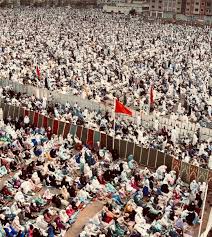Understanding Iftar: The Ritual of Breaking Fast during Ramadan

The Importance of Iftar
Iftar, the evening meal that breaks the daily fast during the holy month of Ramadan, holds profound significance for Muslims around the globe. This practice not only fulfills a religious obligation but also strengthens community bonds as families and friends gather to share a meal after sunset. With over a billion people observing Ramadan, the customs surrounding iftar play a vital role in cultural exchanges and maintaining spiritual discipline.
Traditions and Practices
Traditionally, Muslims break their fast with dates and water, following the example set by the Prophet Muhammad. This simple act symbolizes humility and gratitude. After consuming dates, families typically enjoy a range of foods that vary widely by region. In Middle Eastern countries, one might find lentil soup, hummus, and kebabs, while South Asian cultures often include biryani, samosas, and sweet dishes like jalebi. These meals are not merely sustenance; they represent a time of togetherness and celebration.
Global Observances
In countries where Islam is a minority religion, the practice of iftar often sparks interest among non-Muslim communities. Many places host interfaith iftar dinners, allowing for cultural dialogue and understanding. For instance, in Canada, cities like Toronto and Vancouver have seen community-driven iftars that invite people from diverse backgrounds to partake in the meal, fostering unity and mutual respect.
Health Considerations
As iftar can sometimes lead to overeating due to prolonged hunger, health professionals often encourage moderation and mindful eating. Balanced iftar meals should include fruits, vegetables, proteins, and whole grains to maintain energy levels throughout Ramadan. Hydration is also emphasized as many individuals may go several hours without water.
Conclusion
Iftar is much more than just a meal; it is a symbol of community, gratitude, and resilience. As Ramadan progresses, the importance of iftar will only continue to grow, inviting people worldwide to reflect on the themes of empathy and solidarity. Engaging in iftar can provide outsiders a glimpse into the rich traditions associated with Ramadan, ultimately promoting greater cultural understanding. As societies become increasingly interconnected, practices like iftar may help bridge the gap between different cultures, fostering peaceful coexistence.









